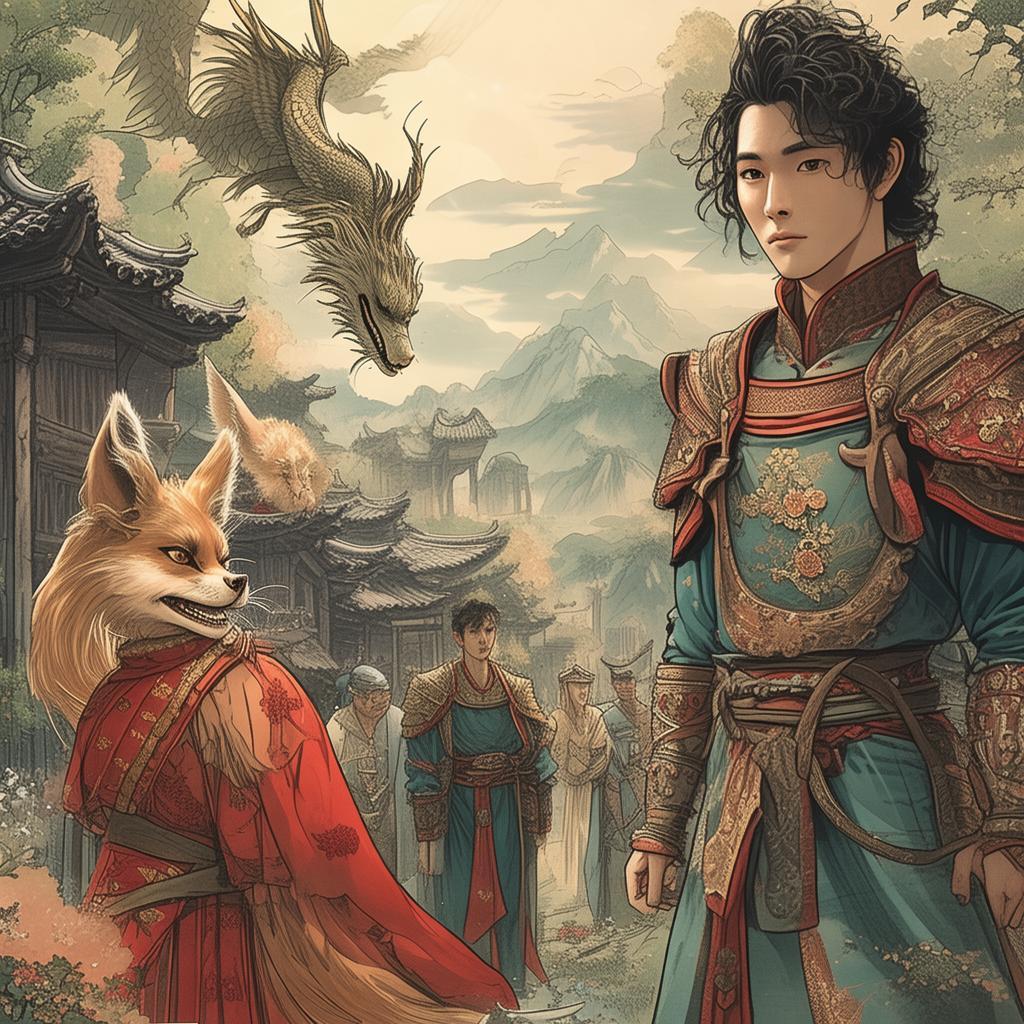The Rebel Bard of the Viking Sagas: Echoes of the Northmen
In the shadow of the towering mountains that rise like the backs of ancient serpents, there lived a bard named Eirik. His voice was like the call of the seagull, carrying the tales of the Northmen across the windswept lands. But Eirik was no ordinary bard; he was a rebel, a soothsayer who dared to speak truths that no other dared to whisper.
Eirik's songs were a blend of legend and defiance, tales of the gods and men that were not to be told as they had been before. His words were like a firebrand in the hearts of the Northmen, igniting a spark of rebellion against the gods who had long ruled their lives.

In the village of Vestrheim, the people gathered around Eirik as he strummed his lyre and sang of the gods' own making. "Hear me, hear me, oh people of the fjords," he would begin, his voice resonating with the echo of the waves crashing against the rocks. "For the gods are not as they say, but as we make them."
One such tale he spun was of the god Odin, who had once been a mortal man like us, but had traded his life for wisdom. Eirik sang of how Odin had stolen the mead of poetry from the dwarves, a drink that gave knowledge to all who partook of it. But Eirik's twist was bold: "Yet even Odin, the Allfather, is but a man in a great mask, and the mead of poetry is but a mirage."
The people listened, their eyes wide with wonder and a hint of fear. For Eirik's words were like a storm cloud gathering on the horizon, threatening to bring forth a tempest that would change everything.
The gods, sensing the stir in the land, sent their agents to Eirik. "Cease your rebellion, Eirik the Bard," they would say, their voices like the whisper of wind through the trees. "For you speak of truths that were not meant to be heard."
Eirik would laugh, a sound that cut through the silence like a sword. "Truths, you say? Or lies? The gods have been liars from the beginning, weaving tales of their own power to keep the people in chains."
The agents of the gods were not without power, and they sought to silence Eirik's voice. But Eirik had allies, the spirits of the earth and the sky, who whispered to him in dreams and guided his hands as he played his lyre.
One night, as the moon hung like a silver coin in the sky, Eirik played a new song. "I sing of the gods, who are but shadows cast upon the wall," he began, his voice rising with passion. "I sing of the humans, who are the true light of the world."
The agents of the gods were present, their faces twisted with anger. "You will be silenced, Eirik," they hissed. But Eirik played on, his song growing in power, until the agents of the gods could no longer bear it. They reached for their weapons, but Eirik's song was like a shield, protecting him from their blows.
In the end, the agents of the gods were forced to retreat, leaving Eirik standing alone under the moon. But his song had spread, and the people of the fjords had heard it. They began to question the gods, to wonder if there was more to the world than they had been told.
The gods themselves were thrown into turmoil. For the first time in ages, they had to confront the possibility that their reign might be challenged by the very people they had long held captive.
Eirik the Bard had become a symbol of defiance, a beacon of hope for those who dared to dream of a world where the gods were not all-powerful. His songs echoed through the Norse lands, a testament to the indomitable spirit of the human heart.
And so, Eirik the Bard continued to sing, his voice a constant reminder that even the mightiest of gods could be challenged by the courage of a single man. For in the end, it was not the power of the gods that ruled the land, but the power of the people, and the songs of a rebel bard who dared to challenge the gods themselves.
In the heart of the Norse fjords, the tale of Eirik the Bard would be told for generations, a story of defiance and the human spirit's unyielding quest for truth. And in the echoes of the Northmen, the legacy of a rebel bard would live on, a testament to the power of words and the enduring nature of freedom.
✨ Original Statement ✨
All articles published on this website (including but not limited to text, images, videos, and other content) are original or authorized for reposting and are protected by relevant laws. Without the explicit written permission of this website, no individual or organization may copy, modify, repost, or use the content for commercial purposes.
If you need to quote or cooperate, please contact this site for authorization. We reserve the right to pursue legal responsibility for any unauthorized use.
Hereby declared.









